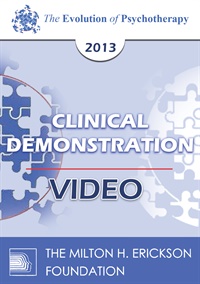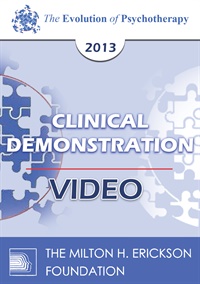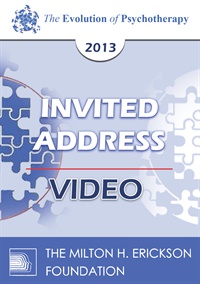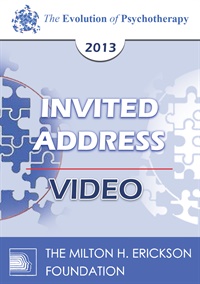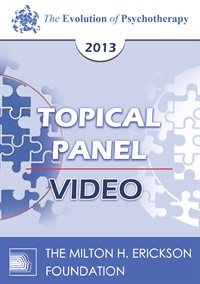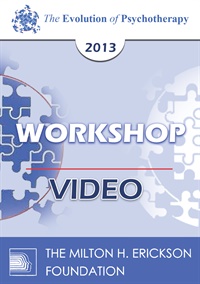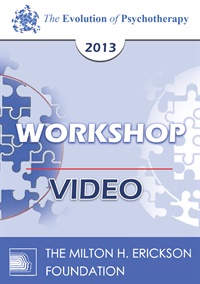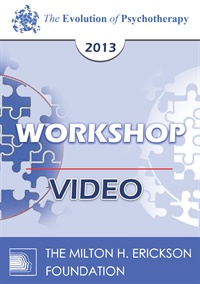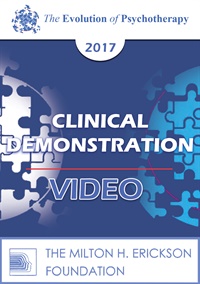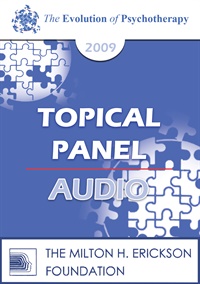
- Average Rating:
- Not yet rated
- Topic Areas:
- Couples Therapy | Topical Panels | Psychotherapy | Communication
- Categories:
- Evolution of Psychotherapy | Evolution of Psychotherapy 2009 | Pioneers in Couples and Family Therapy
- Faculty:
- John Gottman, PhD | Julie Gottman, PhD | Michele Weiner-Davis, LCSW | Harville Hendrix, PhD
- Duration:
- 1 Hour
- Format:
- Audio Only
- Original Program Date:
- Dec 11, 2009
- Short Description:
- Leading voices in couples therapy explore diverse, evidence-informed approaches. The Gottmans draw from decades of research to explain the Sound Relationship House and how couples build intimacy through small, daily moments. Hendrix outlines the value of structured dialogue in healing relational wounds. Weiner-Davis highlights the power of action-based interventions that build skills and restore hope. Together, the panelists reflect on shared clinical values—like adaptability, warmth, and curiosity—and how these principles can guide therapists working with conflict, trauma, and differences in sexual desire.
- Price:
- $15.00 - Base Price
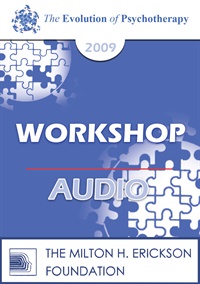
- Average Rating:
- Not yet rated
- Topic Areas:
- Couples Therapy | Workshops | Psychotherapy | Conflict | Marriage
- Categories:
- Evolution of Psychotherapy | Evolution of Psychotherapy 2009 | Pioneers in Couples and Family Therapy
- Faculty:
- Michele Weiner-Davis, LCSW
- Duration:
- 2 Hours 11 Minutes
- Format:
- Audio Only
- Original Program Date:
- Dec 09, 2009
- Short Description:
- This workshop outlines practical strategies for helping couples on the brink of divorce, even when one partner already wants out. Weiner-Davis draws from her Divorce Busting model to demonstrate how hope, directive coaching, and solution-focused interventions can revive connection. She shares how working with one partner can shift dynamics, offers strategies for navigating infidelity, and focuses on honoring emotional pain while guiding couples toward concrete steps forward.
- Price:
- $15.00 - Base Price
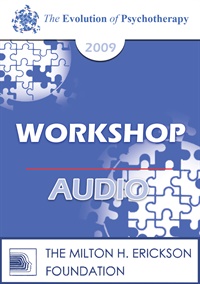
- Average Rating:
- Not yet rated
- Topic Areas:
- Workshops | Couples Therapy | Supervision | Therapist Development | Family Therapy
- Categories:
- Evolution of Psychotherapy | Evolution of Psychotherapy 2009 | Pioneers in Couples and Family Therapy
- Faculty:
- Claudia Black, PhD
- Duration:
- 2 Hours 41 Minutes
- Format:
- Audio Only
- Original Program Date:
- Dec 09, 2009
- Short Description:
- This session addresses the impact of sexual betrayal and compulsive sexual behavior on partners and families. Black examines co-sex addiction, family of origin issues, and the dynamics of deception and false perceptions in relationships. Topics include early stabilization, full disclosure, boundary setting, codependency, spiritual healing, and recovery strategies.
- Price:
- $15.00 - Base Price
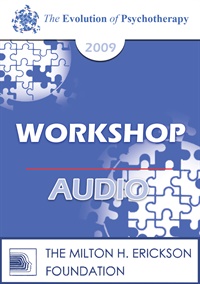
- Average Rating:
- Not yet rated
- Topic Areas:
- Couples Therapy | Workshops | IMAGO | Intimacy | Psychotherapy
- Categories:
- Evolution of Psychotherapy | Evolution of Psychotherapy 2009
- Faculty:
- Harville Hendrix, PhD
- Duration:
- 2 hours 55 minutes
- Format:
- Audio Only
- Original Program Date:
- Dec 09, 2009
- Short Description:
- In this workshop, using lectures, demonstrations and practice, participants will distinguish between the individual and relational paradigm, and learn how to use the Imago Dialogue Process to help couples create a conscious partnership in which difference is accepted, conflict is transformed into creative tension, love is born and sustained, and personal healing and growth are facilitated.
- Price:
- $15.00 - Base Price
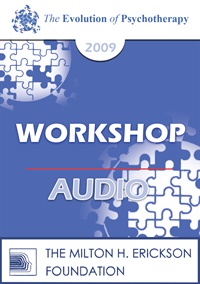
- Average Rating:
- Not yet rated
- Topic Areas:
- Couples Therapy | Workshops | Gottman Method | Relationships | Psychotherapy
- Categories:
- Evolution of Psychotherapy | Evolution of Psychotherapy 2009
- Faculty:
- John Gottman, PhD | Julie Gottman, PhD
- Duration:
- 1 Hour 51 Minutes
- Format:
- Audio Only
- Original Program Date:
- Dec 10, 2009
- Short Description:
- A systemic research-based approach to assessing and treating distressed couples will be presented. Multi-method assessments using questionnaires, interviews, observations, and physiological measurement will be reviewed. Key interventions based on the Gottman Sound Relationship House Theory will be described, and video segments of in-office therapy sessions will be shown to demonstrate them.
- Price:
- $15.00 - Base Price
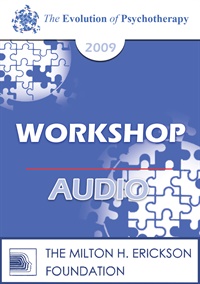
- Average Rating:
- Not yet rated
- Topic Areas:
- Couples Therapy | Workshops | Domestic Violence | Group Therapy | Psychotherapy
- Categories:
- Evolution of Psychotherapy | Evolution of Psychotherapy 2009
- Faculty:
- John Gottman, PhD | Julie Gottman, PhD
- Duration:
- 1 Hour 56 Minutes
- Format:
- Audio Only
- Original Program Date:
- Dec 10, 2009
- Short Description:
- This workshop describes a 22-session couples’ group intervention and curriculum for lower and middle-class couples. Each session begins with a talk-show video showing discussions with couples in poverty on curriculum topics, e.g.’ healing from infidelity, avoiding and healing from domestic violence, etc. The video is followed by group discussion, a brief teaching,and an exercise that focuses on learning new skills. Throughout most of the curriculum,, physiological soothing is taught through biofeedback. Details of the curriculum and video samples will be shown.
- Price:
- $15.00 - Base Price
- Average Rating:
- Not yet rated
- Topic Areas:
- Clinical Demonstrations | Couples Therapy | Psychotherapy | Adlerian Therapy
- Categories:
- Evolution of Psychotherapy | Evolution of Psychotherapy 2013
- Faculty:
- Jon Carlson
- Course Levels:
- Master Degree or Higher in Health-Related Field
- Duration:
- 55:51
- Format:
- Audio and Video
- Original Program Date:
- Dec 13, 2013
- Short Description:
- This program will demonstrate the process of couples therapy including the four steps of effective Adlerian couples therapy (relationship, assessment, insight, and reorientation).
- Price:
-
Sale is $29.00
price reduced from Base Price - $59.00
- Average Rating:
- Not yet rated
- Topic Areas:
- Clinical Demonstrations | Couples Therapy | Emotionally Focused Therapy (EFT) | Post-Traumatic Stress Disorder (PTSD)
- Categories:
- Evolution of Psychotherapy | Evolution of Psychotherapy 2013
- Faculty:
- Sue Johnson, EdD
- Course Levels:
- Master Degree or Higher in Health-Related Field
- Duration:
- 52:59
- Format:
- Audio and Video
- Original Program Date:
- Dec 14, 2013
- Short Description:
- This presentation of a session from a recent EFT training DVD will demonstrate the key elements in a prototypical EFT session; the creation of secure base; unfolding primary emotion; and creating transforming enactments. This session also shows how EFT works with an escalated and in-crisis couple facing PTSD and the echoes of war.
- Price:
-
Sale is $29.00
price reduced from Base Price - $59.00
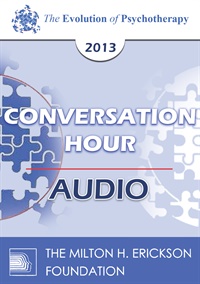
- Average Rating:
- Not yet rated
- Topic Areas:
- Conversation Hours | Psychotherapy | Couples Therapy | Therapist Development | Marriage | Relationships
- Categories:
- Evolution of Psychotherapy | Evolution of Psychotherapy 2013 | Pioneers in Couples and Family Therapy
- Faculty:
- Michele Weiner-Davis, LCSW
- Duration:
- 52:56
- Format:
- Audio Only
- Original Program Date:
- Dec 13, 2013
- Short Description:
- Weiner-Davis shares new insights from her work with couples on the brink of divorce. She invites therapists to ask bold, value-centered questions and look for overlooked moments of connection. With a mix of clinical examples and personal wisdom, she explores how emotional distance, unspoken resentment, and missed cues can quietly unravel relationships—and what can be done to turn things around.
- Price:
- $15.00 - Base Price
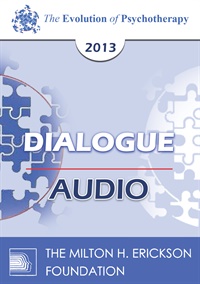
- Average Rating:
- Not yet rated
- Topic Areas:
- Infidelity | Dialogues | Couples Therapy | Psychotherapy
- Categories:
- Evolution of Psychotherapy | Evolution of Psychotherapy 2013
- Faculty:
- John Gottman, PhD | Julie Gottman, PhD | Sue Johnson, EdD
- Duration:
- 1 Hour 2 Minutes
- Format:
- Audio Only
- Original Program Date:
- Dec 13, 2013
- Short Description:
- EP13 Dialogue 01 – Infidelity – John Gottman, PhD, Julie Gottman, PhD, and Sue Johnson, EdD Moderator: Camillo Loriedo, MD, PhD Educational Objectives: Given a topic, describe the differing approaches to psychotherapy, and identify the strengths and weaknesses of each approach.
- Price:
- $15.00 - Base Price
- Average Rating:
- Not yet rated
- Topic Areas:
- Couples Therapy | Invited Addresses | Psychotherapy | Strategic Therapy | Marriage | Relationships
- Categories:
- Evolution of Psychotherapy | Evolution of Psychotherapy 2013 | Pioneers in Couples and Family Therapy
- Faculty:
- Michele Weiner-Davis, LCSW
- Course Levels:
- Master Degree or Higher in Health-Related Field
- Duration:
- 59:12
- Format:
- Audio and Video
- Original Program Date:
- Dec 14, 2013
- Short Description:
- Many couples arrive in therapy feeling worn down, certain that nothing can change. This presentation explores how therapists can intervene at such moments to restore hope and possibility. Drawing from her “Divorce Busting” model, Weiner-Davis shares strategies for challenging resignation, addressing the walkaway wife dynamic, and encouraging proactive support for relationships—both in therapy and beyond. Moderator: Annellen Simpkins, PhD
- Price:
-
Sale is $29.00
price reduced from Base Price - $59.00
- Average Rating:
- Not yet rated
- Topic Areas:
- Couples Therapy | Invited Addresses | Love | Psychotherapy
- Categories:
- Evolution of Psychotherapy | Evolution of Psychotherapy 2013
- Faculty:
- Sue Johnson, EdD
- Course Levels:
- Master Degree or Higher in Health-Related Field
- Duration:
- 58:51
- Format:
- Audio and Video
- Original Program Date:
- Dec 14, 2013
- Short Description:
- EP13 Invited Address 12 – The New Science of Love: A New Era for Couple Interventions – Sue Johnson, EdD We have cracked the code of romantic love. We can precisely target interventions and shape the core defining moments of a love relationship. Adult attachment science offers a clear map to the creation of a secure lasting bond. New findings in neuroscience promise couple interventions that may be the most potent and far-reaching form of therapeutic intervention ever devised.
- Price:
-
Sale is $29.00
price reduced from Base Price - $59.00
- Average Rating:
- Not yet rated
- Topic Areas:
- Couples Therapy | Invited Addresses | Communication | Conflict | Psychotherapy
- Categories:
- Evolution of Psychotherapy | Evolution of Psychotherapy 2013
- Faculty:
- Harville Hendrix, PhD
- Course Levels:
- Master Degree or Higher in Health-Related Field
- Duration:
- 58:14
- Format:
- Audio and Video
- Original Program Date:
- Dec 15, 2013
- Short Description:
- In the old way of thinking, stressed couples were depicted as a failed communication system of interacting pathologies that could be improved by therapists dispensing conflict resolution skills. In the new way of thinking, couples are the source of mutual healing and the fulcrum for social transformation. This lecture will discuss how that shift occurred and its implications, not only for the happiness of couples, but for the relational well-being of society.
- Price:
-
Sale is $29.00
price reduced from Base Price - $59.00
- Average Rating:
- Not yet rated
- Topic Areas:
- Couples Therapy | Family Therapy | Topical Panels | Psychotherapy
- Categories:
- Evolution of Psychotherapy | Evolution of Psychotherapy 2013
- Faculty:
- Harville Hendrix, PhD | Sue Johnson, EdD | Harriet Lerner, PhD
- Course Levels:
- Master Degree or Higher in Health-Related Field
- Duration:
- 55:56
- Format:
- Audio and Video
- Original Program Date:
- Dec 13, 2013
- Short Description:
- EP13 Topical Panel 09 - Family and Couples Therapy - Harville Hendrix, PhD, Sue Johnson, EdD, and Harriet Lerner, PhD Moderator: Camillo Loriedo, MD, PhD Education Objectives: Compare and contrast clinical and philosophical perspective of experts.
- Price:
-
Sale is $29.00
price reduced from Base Price - $59.00
- Average Rating:
- Not yet rated
- Topic Areas:
- Couples Therapy | Family Therapy | Topical Panels | Psychotherapy | Strategic Therapy
- Categories:
- Evolution of Psychotherapy | Evolution of Psychotherapy 2013 | Pioneers in Couples and Family Therapy
- Faculty:
- John Gottman, PhD | Julie Gottman, PhD | Cloe Madanes, HDL, LIC
- Course Levels:
- Master Degree or Higher in Health-Related Field
- Duration:
- 58:52
- Format:
- Audio and Video
- Original Program Date:
- Dec 14, 2013
- Short Description:
- This panel compares approaches to family and couples therapy, blending Madanes’ focus on self-determination and action with Gottman’s Sound Relationship House Theory. Topics include divorce prevention, reversing family hierarchies, and emotion coaching for parenting. Emphasis is placed on practical tools, research-based strategies, and fostering resilience, with a shared commitment to goodwill, meaning, and long-term relationship success.
- Price:
-
Sale is $29.00
price reduced from Base Price - $59.00
- Average Rating:
- Not yet rated
- Topic Areas:
- Workshops | Couples Therapy | Emotionally Focused Therapy (EFT) | Psychotherapy | Relationships
- Categories:
- Evolution of Psychotherapy | Evolution of Psychotherapy 2013
- Faculty:
- Sue Johnson, EdD
- Course Levels:
- Master Degree or Higher in Health-Related Field
- Duration:
- 2:28:09
- Format:
- Audio and Video
- Original Program Date:
- Dec 11, 2013
- Short Description:
- EP13 Workshop 07 – Necessary and Sufficient: The Key Elements of Lasting Change in Couple Therapy – Sue Johnson, EdD
- Price:
-
Sale is $29.00
price reduced from Base Price - $59.00
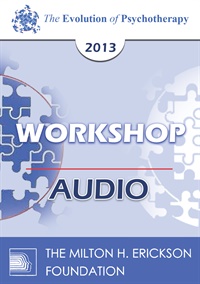
- Average Rating:
- Not yet rated
- Topic Areas:
- Couples Therapy | Workshops | Psychotherapy | Individual Therapy | Strategic Therapy
- Categories:
- Evolution of Psychotherapy | Evolution of Psychotherapy 2013 | Pioneers in Couples and Family Therapy
- Faculty:
- Michele Weiner-Davis, LCSW
- Duration:
- 2 Hours 11 Minutes
- Format:
- Audio Only
- Original Program Date:
- Dec 12, 2013
- Short Description:
- This session explores how therapists can effectively work with just one partner in couples therapy. Drawing on solution-focused methods, the presentation offers tools for setting action-based goals, avoiding blame, and restoring connection. The “last resort technique” is introduced as a powerful option when a partner wants out, helping clients shift patterns, reclaim agency, and create space for change.
- Price:
- $15.00 - Base Price
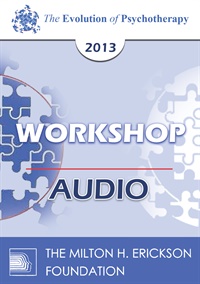
- Average Rating:
- Not yet rated
- Topic Areas:
- Couples Therapy | Workshops | IMAGO | Psychotherapy
- Categories:
- Evolution of Psychotherapy | Evolution of Psychotherapy 2013
- Faculty:
- Harville Hendrix, PhD
- Duration:
- 2 Hours 44 Minutes
- Format:
- Audio Only
- Original Program Date:
- Dec 12, 2013
- Short Description:
- Each couple describes a core scene which happens over and over again from which they want relief and therapists attempt to offer it. Imago Couples Therapy posits that while each core scene is unique, the theme of each couple’s story is identical: ruptured connection and the desire for restoration. All symptoms are branches on this tree. This workshop will develop and demonstrate that theme, and describe and demonstrate a singular intervention that helps couples restore connection.
- Price:
- $15.00 - Base Price
- Average Rating:
- Not yet rated
- Topic Areas:
- Infidelity | Workshops | Couples Therapy | Gottman Method | Psychotherapy
- Categories:
- Evolution of Psychotherapy | Evolution of Psychotherapy 2013
- Faculty:
- John Gottman, PhD | Julie Gottman, PhD
- Course Levels:
- Master Degree or Higher in Health-Related Field
- Duration:
- 2:55:00
- Format:
- Audio and Video
- Original Program Date:
- Dec 12, 2013
- Short Description:
- Workshop begins by presenting the theory of how couples build trust and loyalty or how they erode trust and build a culture of secrecy and betrayal. The three-stage Atone-Attune-Attach Therapy is then presented, and demonstrated with a case.
- Price:
-
Sale is $29.00
price reduced from Base Price - $59.00
- Average Rating:
- Not yet rated
- Topic Areas:
- Couples Therapy | Infidelity | Workshops | Affairs | Psychotherapy
- Categories:
- Evolution of Psychotherapy | Evolution of Psychotherapy 2013 | Pioneers in Couples and Family Therapy
- Faculty:
- Michele Weiner-Davis, LCSW
- Course Levels:
- Master Degree or Higher in Health-Related Field
- Duration:
- 1:54:29
- Format:
- Audio and Video
- Original Program Date:
- Dec 14, 2013
- Short Description:
- This session offers a clear, compassionate path for helping couples recover from infidelity. Weiner-Davis shares tools for restoring trust, managing anger, addressing partial disclosures, and reestablishing connection. Her approach supports both partners with practical strategies and a strong belief in the possibility of healing—even when things feel irreparable.
- Price:
-
Sale is $29.00
price reduced from Base Price - $59.00
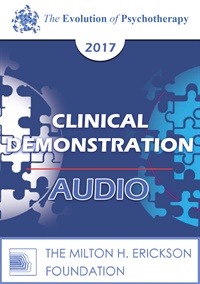
- Average Rating:
- Not yet rated
- Topic Areas:
- Clinical Demonstrations | Attachment | Couples Therapy | Emotionally Focused Therapy (EFT) | Psychotherapy
- Categories:
- Evolution of Psychotherapy | Evolution of Psychotherapy 2017
- Faculty:
- Sue Johnson, EdD
- Duration:
- 27:30
- Format:
- Audio Only
- Original Program Date:
- Dec 15, 2017
- Short Description:
- The session shown is of an unedited live consultation where the previous withdrawn male partner is now accessible and the therapist works with the inability of the female partner to trust, reach and engage with her mate. The session explicitly shows how the therapist works with blocks to the creation of key new responses and shapes bonding moments. This is a classic illustration of Stage 2 EFT in action and shows the moment to moment creation of secure connection. Therapist interventions will be outlined and discussed.
- Price:
- $15.00 - Base Price
Credit available - Click Here for more information
- Average Rating:
- Not yet rated
- Topic Areas:
- Clinical Demonstrations | Couples Therapy | Intimacy | Sex and Sexuality | Relationships
- Bundle(s):
- Learning Track - Couples Starter Kit
- Categories:
- Evolution of Psychotherapy | Evolution of Psychotherapy 2017 | Online Continuing Education
- Faculty:
- Esther Perel, MA, LMFT
- Course Levels:
- Master Degree or Higher in Health-Related Field
- Duration:
- 52 Minutes
- Format:
- Audio and Video
- Original Program Date:
- Dec 16, 2017
- Short Description:
- Through podcasts and experiential exercises we will demonstrate clinical work around sexuality and intimacy with couples. Educational Objectives: Identify common blocks to eroticism including the fear of abandonment or entrapment, as well as how our emotional history shapes our erotic blueprint. Describe three strategies to help couples cultivate eroticism and bring a greater sense of aliveness to their relationship.
- Price:
-
Sale is $29.00
price reduced from Base Price - $59.00
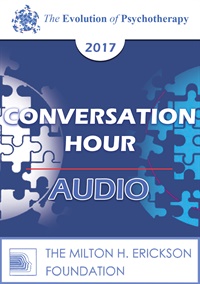
- Average Rating:
- Not yet rated
- Topic Areas:
- Conversation Hours | Couples Therapy | Conflict | Existential Therapy | Psychotherapy | Relationships | Intimacy
- Categories:
- Evolution of Psychotherapy | Evolution of Psychotherapy 2017
- Faculty:
- John Gottman, PhD | Julie Gottman, PhD
- Course Levels:
- Master Degree or Higher in Health-Related Field
- Duration:
- 1:03:04
- Format:
- Audio Only
- Original Program Date:
- Dec 15, 2017
- Short Description:
- EP17 Conversation Hour 05 - John Gottman, PhD and Julie Gottman, PhD Educational Objectives: Describe why not all relationship conflict is the same, and why some conflicts require the therapist to be an existential psychologist. Describe why it is so vital for therapists to measure physiology in couples’ therapy. Describe what Gottman sound relationship house theory and Gottman method couples therapy offers in the following domains: (1) friendship and intimacy, (2) conflict management, (3) shared meaning, (4) trust, and (5) commitment.
- Price:
- $15.00 - Base Price
Credit available - Click Here for more information
- Average Rating:
- Not yet rated
- Topic Areas:
- Great Debates | Couples Therapy | Conflict | Psychotherapy | Relationships
- Bundle(s):
- Learning Track - EP17 Psychoanalysis Stream
- Categories:
- Evolution of Psychotherapy | Evolution of Psychotherapy 2017 | Evolution of Psychotherapy Psychoanalysis Learning Track | Online Continuing Education | Pioneers in Couples and Family Therapy
- Faculty:
- Otto Kernberg, MD | Harville Hendrix, PhD | Helen LaKelly Hunt, PhD
- Course Levels:
- Master Degree or Higher in Health-Related Field
- Duration:
- 1:26:26
- Format:
- Audio and Video
- Original Program Date:
- Dec 14, 2017
- Short Description:
- This debate contrasts psychodynamic and Imago approaches to couples' conflict. One emphasizes transference and unresolved parental dynamics, while the other focuses on empathy, dialog, and the space between partners. Both highlight the role of childhood wounds in adult relationships and the importance of creating safe, empathetic environments where couples can reconnect and prioritize their relationship.
- Price:
-
Sale is $29.00
price reduced from Base Price - $59.00
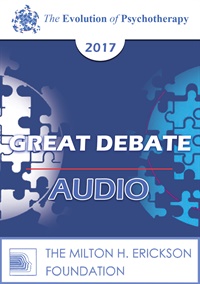
- Average Rating:
- Not yet rated
- Topic Areas:
- Great Debates | Attachment | Psychotherapy | Couples Therapy | Family Therapy
- Categories:
- Evolution of Psychotherapy | Evolution of Psychotherapy 2017
- Faculty:
- Sue Johnson, EdD | Daniel Siegel, MD
- Duration:
- 1:25:28
- Format:
- Audio Only
- Original Program Date:
- Dec 14, 2017
- Short Description:
- We will debate the Promise of attachment science as a guide to the practice of individual couple and family therapy in the 21st century including what this science tells us about how to understand mental health issues and the most direct pathways to positive change, health and resilience.
- Price:
- $15.00 - Base Price


